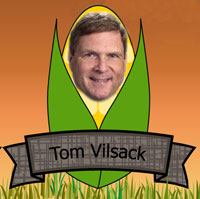Friends of the Earth (FOE) has named U.S. Secretary of Agriculture Tom Vilsack the 2011 Biofool of the Year, the organization’s award that recognizes “leaders that promote dirty biofuels.”
 According to FOE, Vilsack received 2,424 votes of the more than 6,000 cast and they say he definitely deserves the honor. “With Secretary Vilsack at the helm, the USDA has doubled down on its support for corn ethanol and biofuels.” FOE is asking supporters to sign on to a letter they will deliver to Secretary Vilsack later this month, “congratulating him on earning this honor and thanking him for his efforts to promote dirty biofuels at the expense of a comprehensive agriculture policy that would actually help American farmers who grow food!”
According to FOE, Vilsack received 2,424 votes of the more than 6,000 cast and they say he definitely deserves the honor. “With Secretary Vilsack at the helm, the USDA has doubled down on its support for corn ethanol and biofuels.” FOE is asking supporters to sign on to a letter they will deliver to Secretary Vilsack later this month, “congratulating him on earning this honor and thanking him for his efforts to promote dirty biofuels at the expense of a comprehensive agriculture policy that would actually help American farmers who grow food!”
The letter reads, in part:
You justify your support for ethanol subsidies because you think ethanol subsidies support farmers. Yet, ethanol subsidies go to refiners, not farmers, and less than 20 percent of America’s ethanol is produced in farmer-owned refineries. The other 80 percent is produced by conglomerates like Archer Daniels Midland and Big Oil companies.
Actually, the ethanol subsidy – the Volumetric Ethanol Excise Tax Credit (VEETC) or blenders credit – goes to fuel blenders, not farmers or refiners. According to the American Coalition for Ethanol (ACE), as of last year, it is true that totally farmer-owned ethanol plants produced about 2.5 billion gallons of ethanol annually, almost 20 percent of the industry’s total capacity. “However, many other U.S. ethanol plants can be considered “locally owned” because local community members are shareholders in the companies,” according to ACE. That would include the world’s largest ethanol producer, POET, which is a privately held company. The 27 POET Biorefineries are owned by various investors, including farmers, most of whom purchased shares in a private offering. POET’s current production capacity stands at about 1.7 billion gallons annually – or about 12-13 percent of current U.S. production. ADM and oil company-backed plants such as Valero produce a significant amount of the nation’s current capacity, but there are many other company-owned or publicly traded ethanol companies, like Pacific Ethanol, that could hardly be classified as “conglomerates.”
Regardless of the facts, Secretary Vilsack is definitely deserving of this honor recognizing his support of ethanol and Domestic Fuel congratulates him.

